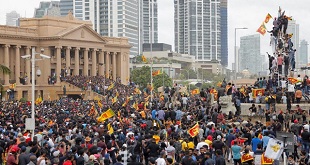Protesters takeover President’s home
The Rajapaksas; one of Sri Lanka’s most powerful political families, were once revered as liberators. They initiated many urban development projects that pushed their country into the upper middle income status with per capita income of US$3,852 in 2019.
Despite that, after clinging to power for about 20 years and entrenching a ruthless, corrupt, autocratic, family-based regime, angry mobs finally kicked them out on July 09. Although the situation was still fluid as we went to press, to say this appears to be the end an era, is not a cliché.
As we went to press, Nandasena Gotabaya Rajapaksa, the latest member of the family to be President of Sri Lanka had on July 13 resigned the presidency and named Ranil Wickremesinghe, his prime minister, to head the government in a move that led to more protests.
It was a humiliating end for 73-year old Gotabaya who in 2005 returned to Sri Lanka from early retirement in the USA, assisted his elder brother – Mahinda Rajapaksa – win presidential elections and was appointed Defence Secretary in his brother’s administration.
Earlier, as a military commander, Gotabaya fought in the early stages of the war with an elite regiment, He fought in several major battles and counter-insurgency operations between 1987 and 1989. He took early retirement from the army and moved into the field of information technology, before immigrating to the United States in 1998.
With Gotabaya as Defence Secretary and his brother Mahinda as President, the Rajapaksa’s were hailed as liberators because the duo oversaw the end of the 27-year long Sri Lankan Civil War by defeating the Tamil Tigers and killing its leader Velupillai Prabhakaran in 2009.
Mahinda was the most popular Sinhala Buddhist leader in post-independence Sri Lanka. He was compared to Sinhala Buddhist kings at victory parades and mass public events.
“Some even hailed him as Emperor Mahinda,” said veteran political analyst Kusal Perera, according to the BBC. Their father, Don Alwin Rajapaksa, had been a parliamentarian and Minister of Agriculture who died in 1967. Their grandfather, Don David Rajapaksa, was an influential official under the colonial government.
But the family lost popularity when, first under Mahinda as President and later Gotabaya, Sri Lanka witnessed misrule, family-based appointments, and corruption.
In 2014 President Mahinda lost to Maithripala Sirisena, a former Minister of Health in his government and general secretary of his party. It was a major upset and the Rajapaksa family was accused of attempting to stage a military coup to recapture power.
The family bounced back in 2019, when Gotabaya defeated Maithripala Sirisena in that year’s presidential election. After the win, Gotabaya appears to have entrenched the excesses of autocratic family-rule with far more abandon than his elder brother ever did.
As a former military officer who had built a reputation for ruthlessness, Gotabaya also increased the power of the executive and nepotism rose as Rajapaksa family members took positions of power.
President Gotabaya appointed his brother, the 76-year old former President Mahinda Rajapaska, as the Prime Minister, leading to the interesting dynamic of two members of the same family – not for the first time in Sri Lanka – heading the executive and legislative branches of government. The appointment did not violate any law.
Prime Minister Mahinda Rajapaska also held the portfolios of Finance, Buddhasasana, Religious & Cultural Affairs, Urban Development, Water Supply and Housing Facilities.
Gotabaya also later appointed his other brother, 71-year old Basil Rohana Rajapaksa as Minister of Finance.
His son Namal Rajapaksa was the Minster of Youth & Sports, and his brother Chamal Rajapakse was the position of Minister of Irrigation. Their niece, Nirupama Deepika Rajapaksa, was powerful parliamentarian and deputy minister who was mentioned in the Pandora Papers of 2021 for setting up shell companies to buy luxury apartments in London and Sydney and make other investments.
At one point it was reported that out of every rupee spent by the Sri Lankan government, 56 cents are directly controlled by members of the Rajapaksa family. In other words, the Rajapaksa’s controlled 56% of the national budget.
Markers of state capture
State capture is defined as “A situation where powerful individuals, institutions, companies or groups within or outside a country use corruption to shape a nation’s policies, legal environment and economy to benefit their own private interests”.
In Sri Lanka’s case, the parliamentary election of August 05, 2020, which enabled President Gotabaya to form a government after his victory in November 2019, was a critical turning point.
The President’s party, the Sri Lanka Podujana Peramuna (SLPP), secured 145 out of 225 total seats in Parliament, leaving it in a strong position to form alliances that would result in two-thirds support in Parliament.
This meant Gotabaya could now repeal the 19th Amendment to the Constitution, which re-introduced the two-term limit for the Presidency. He would also control the Constitutional Council that recommends and approves appointments to independent commissions, the higher courts and other key posts.
Removal of the 19th amendment would also remove the right of access to information as a fundamental right, a key accountability tool that citizens enshrined in it.


